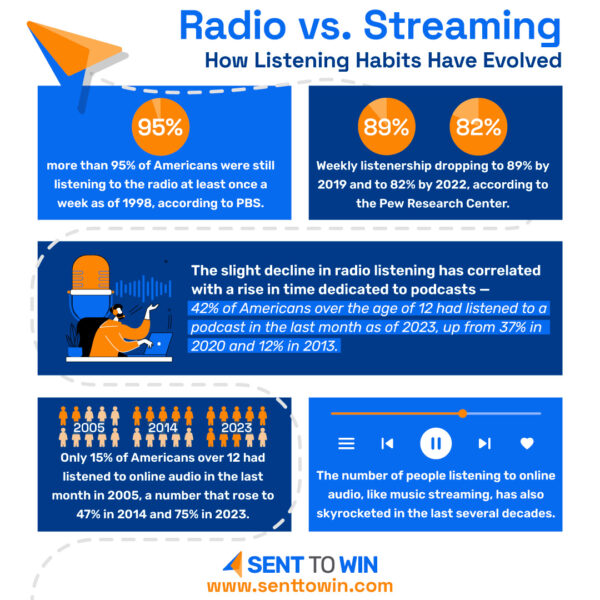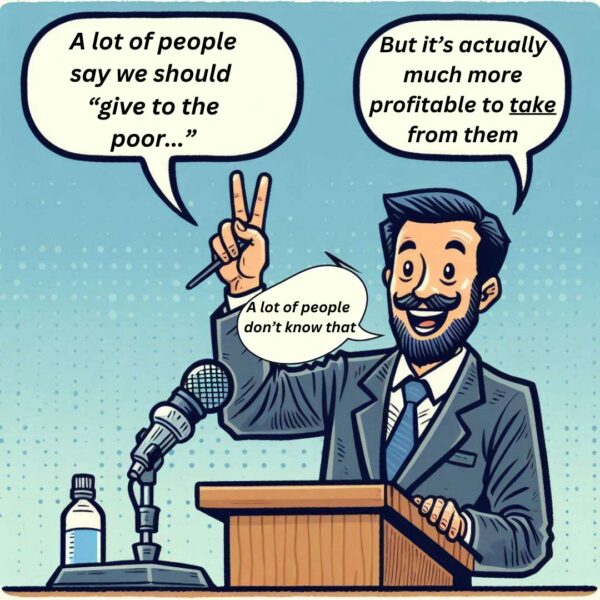Christian Radio: Ministry or a Profit-Machine?
There you are, driving down the road, listening to the Christian music station on your way to work, when all of a sudden the hosts are on, interrupting the music:
“We need your help! This radio station is a listener-supported, not-for-profit ministry, dedicated to bringing glory to God and the love of Jesus to millions of people around the world, every day. People come to know Jesus because of this channel, guys. It’s really changing lives. And we need some everyday heroes to step up and help us keep doing this important work. Listen to this testimonial…”
And then we hear someone talk about how their life has changed, usually because of listening to this radio station, or sometimes even just a story about how coming to faith has impacted them. When the testimonial is over, it’s back to the hosts:
“We need 30 more heroes, guys, just 30 more pledges of $50 a month or more. Can you be one of those 30 people? We need your help to keep on the air and keep spreading hope and life on the airways, day in and day out. Just 30 more people.”
Depending on the radio station, they’ll wait to play more music until they get those 30 monthly supporters. Later, there will be another 50 monthly supporters. Then another 25 monthly supporters. Either someone keeps miscounting, or these numbers of “needed” new monthly supporters are random. During one of the year’s multiple fundraising seasons, it can feel like you’re not supporting Christian music, but radio station fundraising.
And that’s the concern some Christians increasingly have with the business model. Are the high-pressure sales tactics and frequent fundraising drives all a necessary part of providing positive, life-giving music to the world? Or is it something more cynical, or at least profit-motivated?
The line between “non-profit” and “for-profit” seems increasingly blurred these days.
Recently, some large, Christian media conglomerates have come under fire for raking in exorbitant sums of money while giving the impression that they are struggling to get by. That money, in many cases, is then used not simply to pay the bills, but to buy up smaller, independent radio stations and T.V. channels, and to pay a lot of money to the executives.
For example, you may read this job description of a recent career posting by EMF, and be left a little cynical.
The defenders of this business model, however, will say that radio is a medium in slow, steady decline, and consolidation is inevitable at this stage of an industry’s life cycle. Maybe it’s better that stations are being purchased with Christian dollars instead of a PE firm that might use those stations for something less family-friendly?
Regardless of which interpretation appeals to you, we’ll have to start with the numbers and specific players.
Take K-Love, for example, which, along with Air1, is owned by Educational Media Foundation. Despite an infamous spot, in which on-air personalities allegedly praised a local woman who gave to the K-Love pledge drive rather than pay her bills (before asking the listeners to dig deep and also give), K-Love is not on the brink of bankruptcy. The listener-supported radio conglomerate pulled in nearly a quarter of a billion dollars in revenue in 2022, the last year for which their Form 990 is available. Notwithstanding some eyebrow-raising expenditures, the Educational Media Foundation walked away with $72 million in revenue over expenses.
Sounds like a very profitable non-profit.
So why the high-pressure fundraising tactics, which many accuse of being constant, manipulative, and borderline prosperity-gospel? Why do they “encourage listeners who can barely pay bills to donate instead”?
It seems to be funding acquisitions and donor-base expansion, as EMF now owns over 1,000 radio signals (with over 800 stations), buying more and more local stations out each year. Additionally, there are 14 individuals listed on form 990 as making salaries well into the six figures, with CEO Jon Reeves making over $600k. This is still better than a few years ago when then-CEO Michael Novak made a salary of $1.2 million. The organization lists $1 billion in assets and is rich in investments, reserves, and property.
“We are thrilled to add these stations to the K-LOVE network and for the opportunity to continue to bring people closer to Jesus,” said EMF’s Alan Mason, of an acquisition in 2019. But is that what K-LOVE and others are doing? Certainly, there are plenty of people who have turned on the Christian music station and found encouragement in the message of the songs – but in 2024, do we really need a massive media conglomerate to use listener funds to broadcast music that is easily accessible (and free) to everyone with an internet connection?
“Why don’t they just sell ads?” one Sent to Win reader in Georgia asked when interviewed about his issue.
It’s a valid question. Radio has declined from something nearly 95% of adults tuned into at least weekly in 1998 to 82% in 2022.

It’s a steep decline, especially within younger demographics, but there is still a large enough audience to gain some serious advertising dollars. Supposedly, the typical Christian radio model is listener-supported and therefore superior to other stations that constantly interrupt the music… But the music is constantly interrupted on Christian radio, as well, with “non-ad ads.” Clips from celebrity preachers raising their public profile, fundraising drives, and event promotion still feel like ads- and are sold as such to local churches, business owners, and concert promoters. These spots are sold in a sort of backdoor ad-buy/promotion package- ie, give us a “donation” of a certain amount, and “as a thank you,” we’ll mention your event, organization, business, etc. a certain number of times. This somewhat shady workaround of the non-profit rules is the perfect loophole for these stations to have their donation cake and eat it too, sprinkled with “non-ad ad buys” on top. As long as the ad doesn’t have a direct call to action for the sponsor, it’s technically legal.
EMF brought in nearly $240 million in donations in 2022, but with over 800 stations and 1,000 signals, suddenly that number looks less impressive. The average radio station brings in $2 million in ad sales per year. Radio isn’t for every product category, but if you are targeting a certain age demographic in a particular area, it can be very cost-effective (with a comparatively low CPM), produce actual sales, and businesses are still buying air time. Theoretically, EMF could openly sell ads like the other stations, make 10 times as much money, and let the woman who can’t pay her bills… pay her bills.
“It may be that your local church or food pantry needs that money more than this mega-station,” said Warren Throckmorton, back in 2016.
K-LOVE recently moved from Rocklin, CA, to a new 170,000-square-foot headquarters at Berry Farms in Nashville, TN. It has the heroes who give monthly to thank for their impressive new location, but it’s worth considering that a different business model might have funded that relocation better – and without any sticky moral quandaries. I doubt that critics of EMF’s executive compensation would complain if the money came from good old-fashioned ad sales.
But Educational Media Foundation’s K-LOVE and Air1 are hardly the only ministries raising donor funds via media, saying or heavily implying that giving to them is giving to God (and saving them from going off the air). Trinity Broadcasting, for one, pays its top executives more than EMF does. Inspiration Ministries and Inspiration Network pays its CEO $4.5 million (and its general counsel $2.5 million) while soliciting donations from its far less financially secure audience members.
John MacArthur compared some of these Christian media executives to infamous grifter Johann Tetzel, (who sold indulgences leading up to the Protestant Reformation), as he lambasted the high-pressure fundraising tactics and cupidity. Of course, John MacArthur, a full-time minister, is himself personally worth an estimated $15 million, owning three luxury houses.
Maybe the ancient Christians were onto something with that “vow of poverty.”
But in all seriousness, Christians and businesspeople of conscience need to consider what a profound thing it is to ask for donations in the name of doing God’s work. Nearly half of all Americans can’t get their hands on a thousand dollars in an emergency. Money given by the general population is usually given at personal cost, so it should be spent with great care, or perhaps just gathered in a different manner entirely.
Jesus condemned the religious leaders of his day for “devouring widow’s houses” under the pretense of soliciting money for God. Maybe the average listener’s $40/month would be better used to help the single mom next door with her grocery bill. The radio stations will probably be alright. If not, you’ll hear about it the next time the music stops.

Quick Hits
- BCA Research says a U.S. recession is coming.
- Christianity Today offers suggestions on how Christians can support their local public school.
- City of Dreams, an Angel Studios movie showing how children are trafficked across the US border, hits theaters on Friday, August 30th.
- Who’s the newest competitor in the streaming space? Chick-fil-A. (Really.)
- Faith-based tech solutions company “Gloo” raised $110 million in capital.
- Inspiring or insulting? Christians split on Intel CEO’s decision to post a Bible verse alongside a layoffs announcement.
For Kingdom Leaders, By Kingdom Leaders
Bringing Kingdom-minded leaders like you fresh perspectives and insights on business, finance, and leadership trends.




